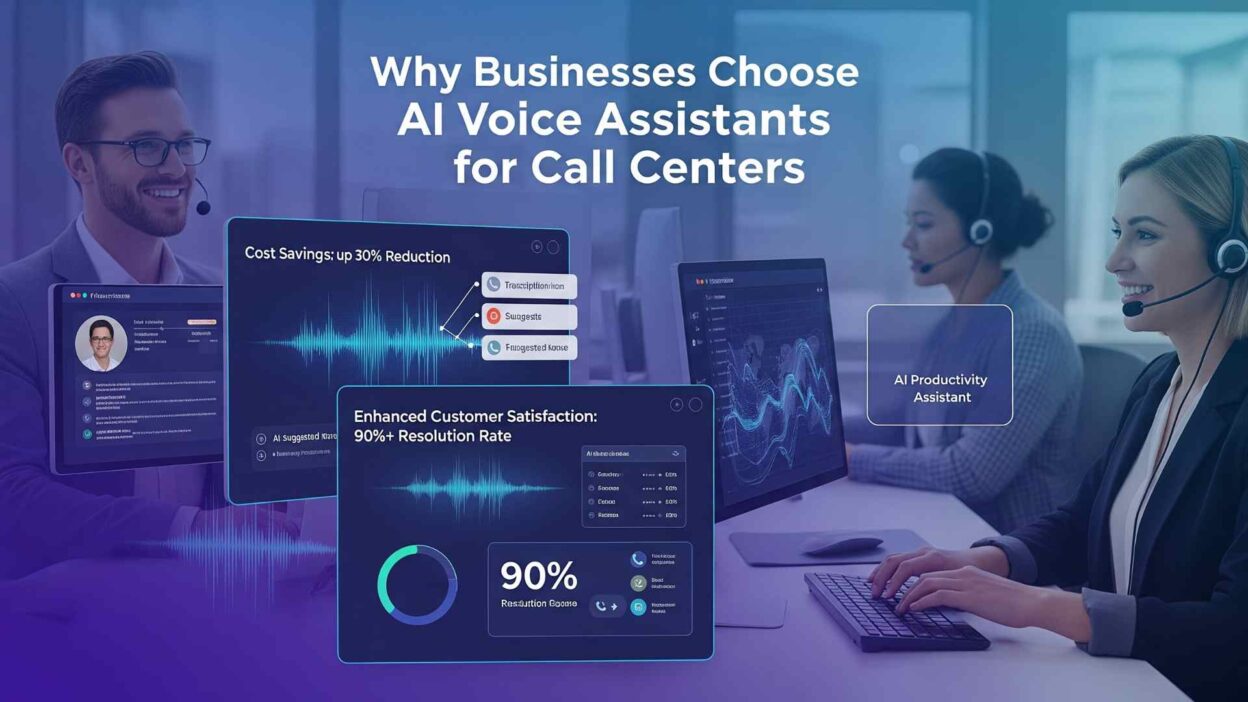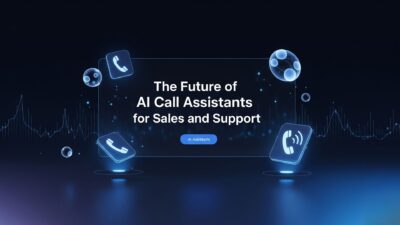TL;DR AI voice assistants for call centers are becoming the preferred solution for businesses seeking efficient customer communication management. Smart companies across industries are discovering the transformative power of voice automation technology. This shift represents a fundamental change in how organizations approach customer service delivery and operational efficiency.
Table of Contents
The Growing Demand for AI Voice Assistants for Call Centers
Modern businesses face increasing pressure to deliver exceptional customer service while controlling operational costs effectively. Customer expectations continue to rise for immediate support availability and personalized service experiences. Traditional call center models struggle to meet these demands without significant resource investments.
Staff shortages plague the call center industry with high turnover rates and recruitment challenges. Training new agents requires substantial time and monetary investments with uncertain retention outcomes. AI voice assistants for call centers provide reliable staffing solutions that eliminate these human resource complications.
Market Trends Driving Voice Assistant Adoption
Customer preference for voice communication remains strong despite digital channel proliferation across various industries. Voice interactions feel natural and require minimal technical skills from customers. Businesses recognize this preference and invest in AI voice assistants for call centers to meet customer communication expectations.
Technological advances make voice automation more accessible and affordable for businesses of all sizes. Cloud-based platforms eliminate infrastructure requirements while providing enterprise-grade capabilities. Cost barriers that previously restricted voice technology to large corporations have disappeared completely.
PreCallAI leads this market transformation with voice bot technology designed specifically for business communication needs. Our platform delivers human-like conversations while maintaining the efficiency advantages of automated systems. Companies choose our solution for reliable performance and exceptional customer experience quality.
Key Advantages of AI Voice Assistants for Call Centers
Voice automation technology provides multiple competitive advantages that traditional call center operations cannot match effectively. These benefits create compelling business cases for voice assistant implementation across diverse industries and company sizes.
24/7 Customer Service Availability
AI voice assistants for call centers operate continuously without breaks, holidays, or sick days, affecting service availability. Customers receive immediate assistance regardless of time zones or business hours. Emergency support becomes available instantly without on-call human agent requirements.
Global businesses serve international customers effectively through round-the-clock voice assistant availability. Time zone differences no longer create customer service gaps or delays. This constant availability improves customer satisfaction while reducing missed opportunity costs.
Consistent Service Quality and Performance
Human agents deliver varying service quality based on experience levels, mood, and training effectiveness. AI voice assistants for call centers provide consistent interactions that meet established quality standards every time. Service scripts and protocols are followed precisely without deviation or shortcuts.
New customers receive the same high-quality service as long-term clients through standardized voice assistant interactions. Brand reputation benefits from reliable service delivery that meets customer expectations consistently. PreCallAI ensures voice interactions align with company values and communication standards.
Scalability Without Staffing Limitations
Traditional call centers require hiring and training additional agents to handle increased call volumes. This scaling process takes weeks or months while potentially compromising service quality during transition periods. AI voice assistants for call centers scale instantly to accommodate any call volume increases.
Seasonal business fluctuations no longer require complex staffing adjustments or temporary agent hiring. Voice automation handles peak periods smoothly while reducing costs during slower business cycles. This flexibility provides significant operational advantages for businesses with variable call volumes.
Cost Analysis of AI Voice Assistants for Call Centers
Financial benefits drive many business decisions to implement voice automation technology in customer service operations. Detailed cost comparisons reveal substantial savings opportunities while improving service capabilities simultaneously.
Direct Cost Savings Breakdown
Human call center agents typically cost $35,000-50,000 annually, including salaries, benefits, and overhead expenses. Training costs add $2,000-5,000 per agent with ongoing education requirements throughout employment. AI voice assistants for call centers eliminate these recurring expenses.
Technology costs for voice automation platforms represent a fraction of human agent expenses while providing superior availability and performance. PreCallAI’s pricing model charges only for actual usage without fixed staffing costs or infrastructure requirements. Businesses save 70-85% on customer service operations through voice automation implementation.
Hidden Cost Elimination Benefits
Agent turnover creates hidden costs through recruitment, training, and productivity loss during transition periods. High-stress call center environments generate turnover rates of 30-50% annually in many organizations. AI voice assistants for call centers eliminate turnover costs and ensure consistent staffing levels.
Quality assurance programs require supervisor time and resources to monitor human agent performance continuously. Voice automation provides built-in quality control through consistent script adherence and performance monitoring. Compliance requirements become easier to maintain through automated interaction logging and analysis.
Implementation Process for Voice Assistant Technology
Successful deployment of AI voice assistants for call centers requires systematic planning and execution approaches. Phased implementation strategies minimize risks while maximizing learning opportunities and system optimization potential.
Planning and Requirements Assessment
Business analysis identifies optimal use cases for AI voice assistants for call centers within existing customer service operations. Call volume patterns reveal peak periods and routine inquiry types suitable for automation. Customer communication preferences guide voice assistant personality and interaction design.
Technology requirements assessment ensures voice automation platforms integrate effectively with current business systems and workflows. CRM integration capabilities enable personalized customer interactions based on historical data and preferences. PreCallAI provides detailed technical consultation to ensure successful implementation planning.
Pilot Program Development and Testing
Limited pilot programs test AI voice assistants for call centers’ effectiveness with controlled customer groups and specific use cases. Small-scale deployments enable performance evaluation and optimization before broader customer exposure. Success metrics from pilot programs guide expansion decisions and system improvements.
Agent training prepares human staff for collaboration with voice automation systems during escalation scenarios. Handoff procedures ensure seamless transitions between automated and human assistance when required. Quality standards maintain consistency across all customer interaction types and channels.
Customer Experience Enhancement Through Voice Technology
AI voice assistants for call centers create more engaging and effective customer service interactions compared to traditional automated systems. Natural conversation capabilities replace frustrating phone menu navigation and rigid response options.
Personalized Communication Experiences
Voice assistants access customer history and preferences to provide tailored responses during each interaction. Previous conversation context remains available throughout current calls for coherent communication flow. AI voice assistants for call centers adapt communication styles based on customer personality and preferences automatically.
Emotional intelligence capabilities enable voice assistants to recognize customer frustration or satisfaction levels during conversations. Response strategies adjust accordingly to address emotional needs while solving practical problems effectively. This sophisticated approach creates more satisfying customer experiences.
Reduced Customer Effort and Friction
Traditional call center interactions often require customers to repeat information multiple times or navigate complex menu systems. AI voice assistants for call centers eliminate these friction points through intelligent conversation management. Customers accomplish objectives quickly without unnecessary complications or delays.
Self-service capabilities expand through voice automation while maintaining human support availability for complex issues. Customers choose their preferred interaction level based on problem complexity and personal preferences. This flexibility creates more comfortable and effective service experiences.
Integration with Existing Call Center Infrastructure
AI voice assistants for call centers must work harmoniously with current customer service tools and processes. Successful integration preserves valuable existing investments while adding voice automation capabilities seamlessly.
CRM and Database Connectivity
Voice assistants require real-time access to customer information during conversations to provide personalized and accurate responses. Database integrations enable instant retrieval of account details, purchase history, and previous interaction records. AI voice assistants for call centers use this information to create relevant and helpful conversations.
Automated data entry capabilities update customer records based on voice conversation outcomes and resolutions. Support tickets are generated automatically when human agent escalation becomes necessary. This integration ensures comprehensive customer service documentation and follow-up procedures.
Quality Assurance and Monitoring Systems
Voice interaction monitoring capabilities provide insights into conversation quality and customer satisfaction levels. Recording and transcription features enable detailed performance analysis and improvement opportunities. AI voice assistants for call centers generate analytics that guide optimization efforts continuously.
Compliance monitoring ensures voice interactions meet industry regulations and company policy requirements. Automated quality scoring identifies conversations requiring attention or additional training. PreCallAI provides comprehensive monitoring tools that maintain service excellence standards consistently.
ROI Measurement and Performance Tracking
Businesses need clear metrics to evaluate AI voice assistants for call centers performance and return on investment. Comprehensive measurement frameworks track both technical capabilities and business impact indicators effectively.
Customer Satisfaction and Engagement Metrics
Voice assistant interaction surveys measure customer satisfaction with automated service quality and helpfulness. Resolution rates indicate how effectively voice technology addresses customer needs without human agent involvement. Repeat usage patterns demonstrate customer comfort and trust with voice assistant capabilities.
Customer effort scores quantify how easily voice assistants help customers accomplish their service objectives. Lower effort scores indicate more effective AI voice assistants for call centers implementations. These measurements guide conversation flow improvements and feature development priorities.
Operational Efficiency and Cost Impact
Cost-per-interaction comparisons demonstrate financial advantages of voice automation versus traditional human agent costs. Volume handling metrics show scalability benefits during peak call periods. Agent productivity improvements occur when voice assistants manage routine inquiries automatically.
Time-to-resolution measurements compare voice assistant performance with human agent efficiency for similar inquiry types. Call center voice automation often resolve issues faster while maintaining higher accuracy rates. These performance advantages create significant competitive benefits for implementing businesses.
Future Outlook for Voice Assistant Call Center Technology
The evolution of natural language processing in call centers continues accelerating with artificial intelligence advances and integration capabilities expanding rapidly. Predictive customer service features will enable proactive support delivery before problems occur.
Advanced personalization algorithms will create unique voice interaction experiences for individual customers based on communication preferences and historical patterns. Industry-specific voice assistants will provide specialized knowledge and capabilities tailored to sector requirements.
PreCallAI invests continuously in next-generation voice technology development to maintain industry leadership positions. Our research focuses on creating more intelligent and natural customer interactions through advanced AI capabilities and integration features.
Read More: How AI Voice Assistants Transform Customer Communication in 2025
Choosing the Right Voice Assistant Solution

Successful AI voice assistants for call center implementation depend on selecting technology partners that understand business requirements and customer communication objectives. Platform capabilities, integration options, and ongoing support quality determine long-term success outcomes.
PreCallAI offers comprehensive voice automation solutions designed specifically for call center environments and customer service excellence. Our proven track record demonstrates consistent results across diverse industries and business sizes. Contact our team today to discover how Natural language processing in call centers can transform your customer service operations and create lasting competitive advantages in your market.
The future of customer communication belongs to businesses that embrace intelligent voice technology today. Natural language processing in call centers provide the foundation for superior customer experiences and operational efficiency that drive business growth and success.





